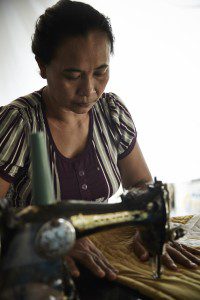By Claire Piper
Guest writer for Wake Up World
Stop right now. Take a look at what you’re wearing; at your shirt, your dress. Maybe you’re in bed? Feel the fabric against your skin. That pencil you’re twirling in your fingers as you read. The chair that you’re sinking your weight into. All the material things that you’re wearing, using, seeing. Take just one of those items and think of all the raw materials that went into creating it and what natural environment all those materials might have come from. Think of all the hands of all the different people who touched that item to get it into your possession. Each person has a life story that might not be so different to your own.
You know by now that some natural environments are being destroyed and pillaged for the raw materials to make our stuff. You also know of the people who are being hurt and exploited as they labour to make, package and ship the stuff in vulnerable countries, particularly in Asia. Do you know, however, the power you have to reverse that destruction and pillaging? That hurt and exploitation? Do you know the opportunity you have to directly contribute to a global manufacturing system that gives as much as it takes?
If every dollar we spend is a vote on how we want our world to be, then the dollars we spend on the stuff we wear and use are directly supporting the practices of the businesses making that stuff.
How can we despair at the use of child labourers in the cotton fields of Uzbekistan if we buy a t-shirt from the mall made with that exact same cotton? How can we shake our heads at the latest fatal factory explosion in China if on our cars are the exact hubcaps those workers were making in dangerous conditions? The businesses who buy these unethically made goods to sell to us must think that we don’t actually care about these things. Because after all, we still give them our dollars.

Photo by Dan Max of Maxy Photography
Before voting with your next dollar on that new stuff you want to buy, do a little digging. Find out if the brand making those jeans are transparent about where they make their goods. Find out if the business manufacturing that new desk you need are upfront about where they source their wood from. Find out if the company producing those pillow cases you’re eyeing up for a gift will tell you about the conditions of the people who sew their products.
You’ll know if they are able to give you enough information to feel good about giving them your dollars. Maybe you will decide to go ahead and buy the stuff anyway. Maybe you will look at an alternative business that works harder to be as ethical as possible in its processes. Maybe you’ll decide you don’t need the new stuff after all. You’ll be making a powerful, conscious decision about what you support from the stuff you buy.
… and that can change the world.
Updated November 2014
About the author:
 Claire Piper is the founder of Tassel (www.tasselathome.com). Tassel makes better stuff not more stuff by providing ethically made, fair-trade and organic bedspreads, pillow cases and cushion covers. A former human rights lawyer, Claire splits her times between Indonesia and New Zealand, creating and seeking design products that contribute to the manufacturing communities and natural environments they are made in.
Claire Piper is the founder of Tassel (www.tasselathome.com). Tassel makes better stuff not more stuff by providing ethically made, fair-trade and organic bedspreads, pillow cases and cushion covers. A former human rights lawyer, Claire splits her times between Indonesia and New Zealand, creating and seeking design products that contribute to the manufacturing communities and natural environments they are made in.

If you've ever found value in our articles, we'd greatly appreciate your support by purchasing Mindful Meditation Techniques for Kids - A Practical Guide for Adults to Empower Kids with the Gift of Inner Peace and Resilience for Life.
In the spirit of mindfulness, we encourage you to choose the paperback version. Delve into its pages away from screen glare and notifications, allowing yourself to fully immerse in the transformative practices within. The physical book enriches the learning process and serves as a tangible commitment to mindfulness, easily shared among family and friends.
Over the past few years, Wake Up World has faced significant online censorship, impacting our financial ability to stay online. Instead of soliciting donations, we're exploring win-win solutions with our readers to remain financially viable. Moving into book publishing, we hope to secure ongoing funds to continue our mission. With over 8,500 articles published in the past 13 years, we are committed to keeping our content free and accessible to everyone, without resorting to a paywall.







